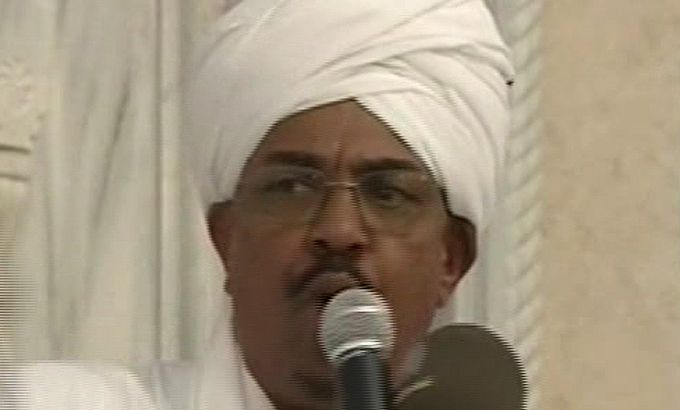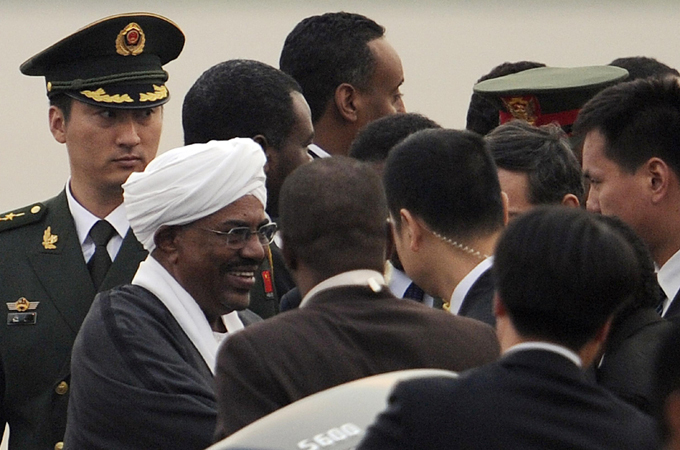Bashir says army to continue campaign
Sudanese president says army operation in border state of South Kordofan to continue until it is “cleaned” of rebels.

Omar al-Bashir, the Sudanese president, has ordered his army to continue fighting in South Kordofan state until it has “cleaned” the border area of rebels.
“I ordered the Sudanese Armed Forces to continue their operations in South Kordofan until they clean the state of rebels,” Bashir said during a speech at Friday prayers in a Khartoum mosque.
Heavy fighting has raged in the state since June 5, as government forces have taken on Southern-aligned armed groups.
His statement was broadcast on national television, and comes just eight days before the south of the country officially secedes.
The conflict in South Kordofan has escalated tensions between north and south Sudan.
“Many people may think that this is going to be an open war with the South or that it might lead to a great crisis […] at this particular time,” Al Jazeera’s Mohamed Vall reported from Khartoum.
“At the moment, we know that this is so far limited to the South Kordofan region, which is not part of the South, and SPLM (North), which is fighting this war against the Sudanese government, is not actually any longer an official part of the SPLM (South), which is ruling south Sudan.”
Suliman Baldo, the Africa director at the International Centre for Transitional Justice (ICTJ), told Al Jazeera that he did not think there would be a war between the north and south Sudan.
ICTJ is an international organisation based in New York, that helps to address human rights abuses during times of a changeover from conflict or state repression.
Baldo said he expected there to be a “war by proxy”.
The “government of Khartoum… relies on militias that are ethnically recruited to attack armed groups that challenge the authority or the central government or who claim more share in power, more recognition of their culture and ethnic diversity within a broader Sudan”.
‘Demonstration of force’
Baldo said that the conflict was a show of “a demonstration of force” by Bashir to strengthen northern Sudan’s negotiating position in Addis Abbaba where discussions are taking place with the facilitation of the African Union.
“There are several issues that the independence of south Sudan have not settled and there are very tense negotiations that are taking place now, such as the demarcation of the north and the new states of Sudan. [There is] the question of sharing – of revenue, [from] oil and other natural resources along the border.”
The northern Sudanese government signed a preliminary peace deal with the northern branch of the SPLM in Addis Ababa on Tuesday, but Bashir’s speech appears to have diminished the prospects for any final cessation of hostilities.
 |
| Bashir’s speech came just hours after his return from China, a key ally of the Khartoum government [Reuters] |
The accord had boosted hopes that a comprehensive political and security settlement for the ethnically divided northern Blue Nile and South Kordofan states, both home to a large number of SPLM supporters, could be reached.
It had included a provision for the deployment of Ethiopian peacekeepers, but a Sudanese army spokesman told Al Jazeera that there is no specific date for that deployment nor has there been a precise agreement on the issue yet.
On Wednesday, a northern state minister said both sides had agreed “in principle” at talks in Ethiopia to hold the ceasefire, pending the finalisation of details.
Violence in South Kordofan broke out after Abdelaziz Hilu, former deputy governor and the second-in-command of the SPLM’s northern branch, almost won the state’s gubernatorial election in May. Hilu withdrew his candicacy at the last minute in the race for the governorship, alleging fraud.
The government in Khartoum denied the allegations and the largest international observer group in the country called the result of the vote “credible”.
Bashir called Hilu “criminal” and accused him of being responsible for the indiscriminate killing of civilians.
“Abdelaziz al-Hilu is a criminal and he will continue as a criminal until he faces justice. He has asked everyone who carries a weapon to kill civilians. He cannot return [from the rebellion] as a normal citizen,” the president said.
Bashir’s speech came just hours after his return from an official visit to China.
Princeton Lyman, the US special envoy to China, described that trip as constructive, lauding China’s message to Bashir on the issue of the south gaining independence.
‘Civilian casualties’
The UN reported on Thursday that army air raids had taken place in the rebel stronghold of Kauda, in the Nuba mountains. Those strikes caused “civilian casualties and severe injuries”, the UN said.
“Aerial bombing was also reported in Talodi on June 25, Kadugli town on June 27 and Umm Durein on June 28. Sporadic gunfire was reported east of Talodi on June 28,” the UN humanitarian office (OCHA) said in its latest report.
The fighting in South Kordofan has so far forced more than 60,000 people to leave their homes, the UN says.
“Authorities in South Kordofan are barring international aid agencies from entering the region and supply lines have been cut,” Susan Purdin, director of the International Rescue Committee’s south Sudan programmes, said in a statement.
“We’re extremely worried about the safety and well-being of people who live there. We’re hearing stories of horrible atrocities.”
Church leaders and activists say the army’s campaign is part of a government policy of ethnic cleansing, targetting the Nuba people. The Nuba sided with the rebels during the 1983-2005 war with Khartoum, but the government denies that it has targetted them specifically.
Both Barack Obama, the US president, and Ban Ki-moon, the UN secretary-general, have urged a ceasefire in the state.
South Kordofan is important to the north as it is home to the most productive oil fields that will remain in its control after the split. The south is set to take as much as 75 per cent of Sudan’s 500,000 barrels of daily oil output.
Al Jazeera’s Vall reported that the major risk was if fighting in the area spilled over into other contested states.
“If this spills over to other regions and if the deployment of [peacekeeping] troops takes a long time, longer than expected, that might be a real crisis for the two sides,” he said.